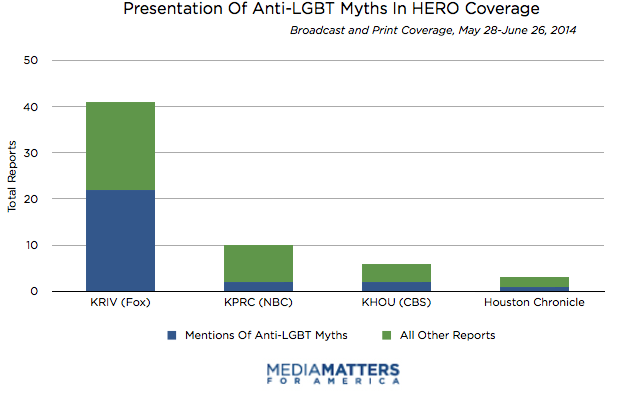
Houston looks set to become ground zero for the country's next major LGBT civil rights battle. How national and local media cover that fight could help determine how the rest of the country thinks about the next stage of the struggle for full LGBT equality.
For the past 15 months, the city of Houston has been embroiled in a drawn-out battle over its non-discrimination ordinance, which prohibits discrimination based on race, sex, ethnicity, military status, marital status, religion, disability, national origin, age, familial status, genetic information, sexual orientation, or gender identity.
The Houston City Council adopted the Houston Equal Rights Ordinance (HERO) in May 2014, in the face of fierce opposition from anti-LGBT groups who immediately launched a signature-collection effort to put the ordinance on the ballot for possible repeal. Houston City Attorney Dave Feldman disqualified their effort after determining that many of the signatures collected were invalid. The result was a protracted and messy legal battle that has drawn the attention of Fox News and national conservative figures.
On July 24, the Texas Supreme Court overturned a district court decision and ordered the city to either repeal HERO or put the measure up for a public vote in the November 2015 election.
That decision has set the stage for an even more heated and expensive battle over the fate of the ordinance - one that will likely serve as a test case for how the media, and Americans at large, talk about LGBT equality in the new era of marriage equality.
The Media's One-Sided HERO Coverage
HERO has been the target of conservative misinformation since it was unveiled in April of 2014. Local and national anti-LGBT groups, including the Houston Area Pastor Council, Texas Values, and Alliance Defending Freedom (ADF), rallied against the ordinance.
Opponents attacked HERO by lying about the ordinance; claiming it would undermine religious liberty, trigger costly and frivolous lawsuits, and allow sexual predators to sneak into women's restrooms by pretending to be transgender - predictions that have proven false in other Texas cities with similar laws in place. Horror stories about public restrooms became a central sticking point in the city council's debate over HERO, with opponents even labeling the ordinance the "Sexual Predator Protection Act."
The “sexual predator” talking point has been thoroughly debunked by law enforcement experts, government officials, and advocates for sexual assault victims in states and cities that have had laws like HERO on their books for years. Non-discrimination laws don't make sexual assault legal, and sexual predators don't decide to act based on whether a local non-discrimination ordinance exists.
But that didn't stop local media outlets in Houston from uncritically repeating the “bathroom” myth in their reporting on HERO. Opponents' talking points permeated local news coverage of the ordinance, resulting in a public debate that focused on conservative fearmongering rather than anti-LGBT discrimination:

That kind of irresponsible coverage continued after HERO's passage, as the push to put the ordinance on the ballot gave way to an intense legal battle. Houston's Fox affiliate continued to uncritically repeat the bogus “bathroom” myth, and before long, Fox News' national network took notice. Led by Mike Huckabee, the network turned the fight in Houston into a national conservative rallying cry, peddling myths about HERO and misrepresenting legal proceedings to stoke outrage. Presidential hopeful Sen. Ted Cruz (R-TX) joined Huckabee in using the controversy to establish his social conservative bona fides. By November of 2014, thousands of activists were descending on Houston to rally against HERO and demand a public vote.
Following the Texas Supreme Court's decision last week, Houston Mayor Annise Parker expressed confidence that voters will approve HERO if it's put up for a vote. If that happens, Houston voters will almost certainly be bombarded with ads and mailers peddling the same misinformation that has defined conservatives' opposition to the ordinance thus far. Scare tactics that invoke bathroom attacks and religious freedom are incredibly effective in getting people to vote against legal protections for LGBT people. And if local media outlets don't do the vital work of separating fact from fiction, HERO could become the first major LGBT defeat in the wake of the Supreme Court's landmark marriage equality ruling.
HERO As A Test Case
The fight over Houston's non-discrimination ordinance foreshadows the emerging national LGBT civil rights battle in America: the push for comprehensive non-discrimination protections. On July 23, Democrats in Congress introduced the "Equality Act," which would ban anti-LGBT discrimination in employment, housing, public accommodations, and other areas. Major national LGBT groups have thrown their support behind the bill, signaling their shift in priorities now that the marriage fight has largely ended. Opponents have already begun attacking the Equality Act with the same talking points they used in their fight against HERO: horror stories about religious freedom, special rights, and bathroom predators.
It remains to be seen how effective conservatives will be at influencing the media narrative around non-discrimination protections. Since losing their fight against marriage equality, anti-LGBT activists have made controlling media depictions of non-discrimination efforts a central part of their fight against LGBT equality. By characterizing non-discrimination laws as a threat to religious freedom and personal safety, conservatives are hoping to hijack the conversation about even the most basic legal protections for LGBT people.
As the fourth largest city in the country, Houston could be a test case for how successful anti-LGBT conservatives will be at injecting their bogus talking points into media coverage of major non-discrimination fights. If anti-gay conservatives there can use misinformation and fearmongering to defeat HERO, it will set a powerful example for national anti-LGBT groups looking to shape the broader debate around laws like the federal Equality Act. If, on the other hand, local media outlets debunk and correct misinformation about the measure, they'll be setting a positive precedent for national media outlets and helping set the tone for how Americans view the continuing struggle for LGBT equality.